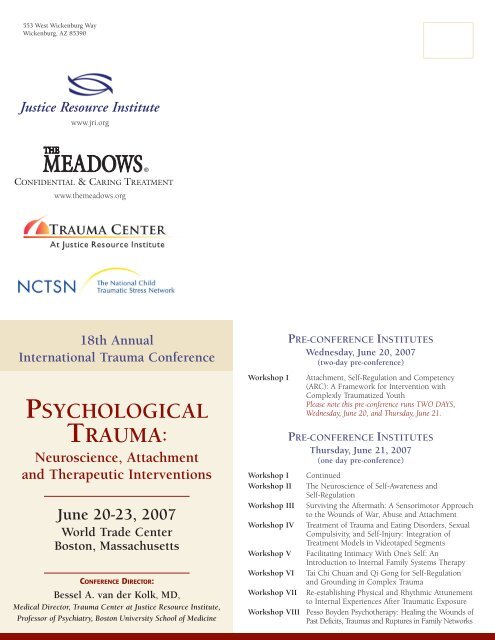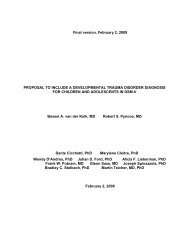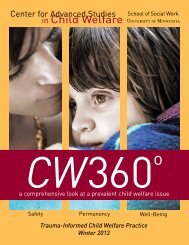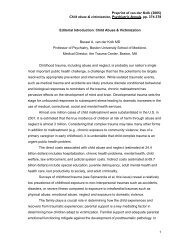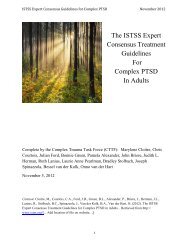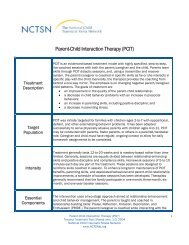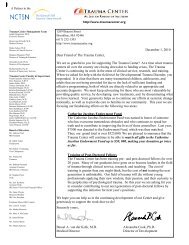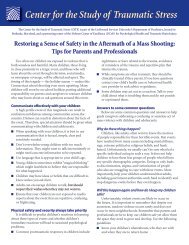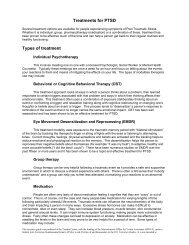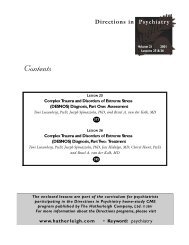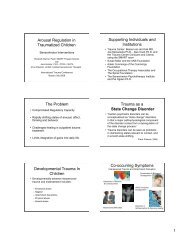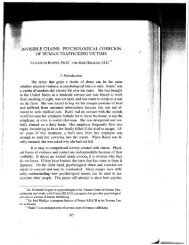10011_Meadows_TraumaConf_2007.qxd:Layout 1 - The Trauma ...
10011_Meadows_TraumaConf_2007.qxd:Layout 1 - The Trauma ...
10011_Meadows_TraumaConf_2007.qxd:Layout 1 - The Trauma ...
You also want an ePaper? Increase the reach of your titles
YUMPU automatically turns print PDFs into web optimized ePapers that Google loves.
553 West Wickenburg WayWickenburg, AZ 85390Justice Resource Institutewww.jri.orgCONFIDENTIAL & CARING TREATMENTwww.themeadows.org18th AnnualInternational <strong>Trauma</strong> ConferencePSYCHOLOGICALTRAUMA:Neuroscience, Attachmentand <strong>The</strong>rapeutic InterventionsJune 20-23, 2007World Trade CenterBoston, MassachusettsCONFERENCE DIRECTOR:Bessel A. van der Kolk, MD,Medical Director, <strong>Trauma</strong> Center at Justice Resource Institute,Professor of Psychiatry, Boston University School of MedicineWorkshop IPRE-CONFERENCE INSTITUTESWednesday, June 20, 2007(two-day pre-conference)Attachment, Self-Regulation and Competency(ARC): A Framework for Intervention withComplexly <strong>Trauma</strong>tized YouthPlease note this pre-conference runs TWO DAYS,Wednesday, June 20, and Thursday, June 21.PRE-CONFERENCE INSTITUTESThursday, June 21, 2007(one day pre-conference)Workshop I ContinuedWorkshop II <strong>The</strong> Neuroscience of Self-Awareness andSelf-RegulationWorkshop III Surviving the Aftermath: A Sensorimotor Approachto the Wounds of War, Abuse and AttachmentWorkshop IV Treatment of <strong>Trauma</strong> and Eating Disorders, SexualCompulsivity, and Self-Injury: Integration ofTreatment Models in Videotaped SegmentsWorkshop V Facilitating Intimacy With One’s Self: AnIntroduction to Internal Family Systems <strong>The</strong>rapyWorkshop VI Tai Chi Chuan and Qi Gong for Self-Regulationand Grounding in Complex <strong>Trauma</strong>Workshop VII Re-establishing Physical and Rhythmic Attunementto Internal Experiences After <strong>Trauma</strong>tic ExposureWorkshop VIII Pesso Boyden Psychotherapy: Healing the Wounds ofPast Deficits, <strong>Trauma</strong>s and Ruptures in Family Networks
PRE-CONFERENCE INSTITUTESJune 20 - 21, 2007RegistrationProgramLunch (on your own)8:00 - 8:30 AM8:30 - 5:15 PM12:30 - 2:00 PMPre-conference workshop I meets all day, Wednesday, June 20, and Thursday, June 21.Pre-conference workshops II, III, IV, V, VI, VII, and VIII meet all day Thursday, June 21.Please choose Workshop I, II, III, IV, V, VI, VII or VIII on the registration form.WORKSHOP I: Attachment, Self-Regulation andCompetency (ARC): A Framework for Interventionwith Complexly <strong>Trauma</strong>tized YouthMargaret Blaustein, PhD • Kristine M. Kinniburgh, LICSW(This workshop meets two days – Wed., June 20, and Thurs., June 21)A substantial percentage of children exposed to trauma has experienced multipleor prolonged exposures. This demands a flexible model of practice, embeddedin a framework that can be adapted to the social environment in which thechild is being treated. This workshop constitutes the official two-day formaltraining in ARC. It introduces a framework for intervention to address themultiple individual, familial, and systemic needs of this population, built around10 key principles of intervention. Discussion points for each principle includekey concepts, educational information for providers and caregivers, specific toolsfor clinicians, and developmental considerations. This workshop will combinedidactic training, experiential activities, hands-on participation, and case application.Enrollment will be limited to 60 participants.WORKSHOP II: <strong>The</strong> Neuroscience of Self-Awarenessand Self-RegulationRuth Lanius, MD • Jim Hopper, PhD • Sarah Lazar, PhD •Eric Vermetten, MD, PhD • Mohammed R. Milad, MD •Bessel A. van der Kolk, MDThis pre-conference workshop will address neuroscientific and clinical perspectiveson mindfulness and self-regulation, based on presentations and videodemonstrations. We will experientially demonstrate how people can play a rolein their own physiological self-regulation with focused attention, movementand breathing. We will examine the psychological processes and brain circuitsimplicated in emotion dysregulation, emotional awareness and mindfulness,including the role of the medial prefrontal cortex in conditioned fear extinction,the neural underpinnings of positive and negative emotional experiences, andthe effects of pharmacological interventions on brain activation. We will presentevidence that mindfulness meditation can alter the structure and function ofkey brain regions involved in emotional awareness and emotional regulation.WORKSHOP III: Surviving the Aftermath: A SensorimotorApproach to the Wounds of War, Abuse and AttachmentPat Ogden, PhD • Michael Broas, LMTThrough lecture, discussion, brief experiential exercises, and videotaped excerptsof therapy sessions, this workshop will explore the effects of abuse, combat,and torture. Participants will learn the body’s response to trauma, attachmentrelationships and developmental issues, as well as how these experiencesinfluence each other. <strong>The</strong> morning presentation will focus on SensorimotorPsychotherapy approaches to childhood trauma; Dr. Ogden will be joined forthe afternoon by Michael Broas, a Vietnam veteran whom she treated.Videotaped excerpts of Mr. Broas’ treatment will illustrate interventions thathelp combat trauma survivors to integrate their experiences. <strong>The</strong> very act ofremembering commonly exacerbates symptoms; therefore, somatic interventionsthat facilitate a gradual exposure to the procedural components of thememory, with a primary focus on somatic processing, will be explored.WORKSHOP IV: Treatment of <strong>Trauma</strong> and Eating Disorders,Sexual Compulsivity, and Self-Injury: Integration ofTreatment Models in Videotaped SegmentsMark Schwartz, ScD • Lori Galpern, MSW, LCSWDissociation is more related to early attachment problems than acute or chronictrauma. An eating disorder is very much an ego-state that “hijacks” the bodywith concomitant poor self-differentiation. Many eating disorder patients comefrom families with no overt trauma. Utilizing a dissociative and attachmentbasedmodel, this workshop will review the presenter’s experience with eatingdisorder clients at an intensive inpatient setting. To provide a “hands-on” slant,videotaped segments of therapy sessions will be integrated with theoretical andconceptual aspects of treatment. Special emphasis will be placed on techniquesto facilitate self-differentiation. Assessing outcome also will be discussed.WORKSHOP V: Facilitating Intimacy with One’s Self:An Introduction to Internal Family Systems <strong>The</strong>rapyRichard Schwartz, PhDOne central aspect of the Internal Family Systems model is the elaboration ofthe concept of “self.” This model necessitates the therapist’s exploration of hisor her own internal experience. Helping clients trust self-leadership catalyzesself-healing. <strong>The</strong> therapist needs to develop parallel self-awareness in order toassist clients in their self-reorganization. Successful psychotherapy of childhoodtrauma and neglect results not only in effective coping with the past, but alsoin a transformation in the capacity for intimacy.WORKSHOP VI: Tai Chi Chuan and Qi Gong forSelf-Regulation and Grounding in Complex <strong>Trauma</strong>Michael A. Grodin, MD • Derek Fulker, MA • Dan Kleiman •Robert Saper, MD, MPH • Lin Piwowarczyk, MD, MPH •Bill Robertson • Alan DougallThis is an experiential workshop that will address and demonstrate the use ofthe Internal Energy Arts (Tai Chi Chuan, Chi Gung) as a way for trauma survivorsto reconnect to their body, mind and spirit. <strong>The</strong> leader’s experience in caring forsurvivors of torture and refugee trauma will demonstrate how these exercisesserve as self-regulatory and grounding techniques for the treatment of complexPTSD. Workshop participants will learn the simple process of “Turning the WheelChi Gung.” Tai Chi master teachers will provide individualized instruction.WORKSHOP VII: Re-establishing Physical andRhythmic Attunement to Internal ExperiencesAfter <strong>Trauma</strong>tic ExposureSteven Gross, MSW • Robert Macy, PhD • Ron Jones •Dicki Johnson Macy, M.Ed, LMHC, ADTR • Anthony Toombs •Joseph Spinazzola, PhD • Bessel A. van der Kolk, MD<strong>Trauma</strong>tic and uncontrollable events overwhelm survivors with a sense ofimpotence and immobilization. <strong>The</strong> visceral experience of helplessness andfear causes a core re-organization of the self. Transformation of self-perceptionthrough physical actions and attuned rhythms can help change victims intoembodied survivors. This pre-conference workshop will explore the origins andstep-wise evolution of the “interoceptive voice,” which acts as a natural antidoteto experiences of fear, helplessness and impotent rage. Participants will learn,through a series of experiential activities, how to work with voice, rhythms,movement, and postures. <strong>The</strong>se activities will be applied to working withtraumatized children ages 18 months to 3 years, 3 years to 6 years, 6 years to10 years, pre-teens and teens.WORKSHOP VIII: Pesso Boyden Psychotherapy:Healing the Wounds of Past Deficits, <strong>Trauma</strong>sand Ruptures in Family NetworksAlbert Pesso, BASection I: Fundamentals of body-based techniques are used in creation of newmemories that ameliorate the effects of traumatic histories and maturationaldeficits. Interventions provide limits for overwhelming emotional impulses inorder to reverse the traumatic consequences of loss of self-control and to helpreturn a sense of meaning to life.Section II: “Holes in Roles” presents a perspective on the compassionateresponses of children who have heard stories of traumatic histories of presentand long-dead family members and its paradoxical consequences. Livedemonstrations applying PBSP “structures” will illustrate how to create new,need-satisfying, symbolic memories to help clients handle the normal vicissitudesof life.
PSYCHOLOGICAL TRAUMA:Neuroscience, Attachment and <strong>The</strong>rapeutic Interventions June 22 - 23, 2007COURSE DESCRIPTION<strong>The</strong> study of psychological trauma has been accompanied by anexplosion of knowledge about how experience shapes the centralnervous system and the formation of the self. Developments in theneurosciences, developmental psychopathology and informationprocessing have contributed to our understanding of how brainfunction is shaped by experience and the belief that life itselfcan continually transform perception and biology. Within thedisciplines of psychiatry and psychology, the study of trauma hasprobably been the single most fertile area in helping to develop adeeper understanding of the relationship among the emotional,cognitive, social and biological forces that shape human development.Starting with post-traumatic stress disorder (PTSD) inadults and expanding into early attachment and overwhelmingexperiences in childhood, this endeavor has elucidated howcertain experiences can “set” psychological expectations andbiological selectivity.We have learned that most experience is automatically processedon a subcortical level, i.e., by “unconscious” interpretations thattake place outside of awareness. Insight and understanding haveonly a limited influence on the operation of these subcorticalprocesses. When addressing the problems of traumatized peoplewho, in a myriad of ways, continue to react to current experienceas a replay of the past, there is a need for therapeutic methodsthat do not depend exclusively on understanding and cognition.OBJECTIVE<strong>The</strong> objective of this course is to present current research findingsabout how people’s brains, minds and bodies respond to traumaticexperiences, how they regulate emotional and behavioralresponses, and the role of relationships in protecting and restoringsafety and regulation.We will explore post-traumatic responses at different developmentallevels, as well as the treatment implications of these findings.We also will explore how affect regulation and the interpretationof innocuous stimuli as threats require interventions aimed atrestoring active mastery and the capacity to focus on the present.Since traumatic memories often are dissociated and may beinaccessible to verbal recall or processing, close attention must bepaid to the development of inner resources to deal with dysregulationand helplessness, and the careful timing of the explorationand processing of the traumatic past.Last, the course will examine cutting-edge treatment interventionsfor various trauma-based symptoms.A Perfect Waterfront Location<strong>The</strong> Seaport World Trade Center is located on Boston Harbor—abeautiful place for a conference/short vacation in the spring andearly summer. With an abundance of sun and temperatures in thelow 70s, the harbor isone of Boston’s best-keptsecrets this time of year.Located within easywalking distance of theSilver Line subway, thehotel is convenient to allof Boston’s sites and visitorattractions.CONFERENCE LOCATIONSeaport World Trade CenterCONFERENCE HOTEL<strong>The</strong> Seaport Hotel (adjacent to the World Trade Center)One Seaport LaneBoston, MA 02210877-732-7678RESERVATIONSConference attendee rate is $199 per night. Reservations can bemade directly with the hotel; call toll-free 1-877-SEAPORT.Please mention that you are attending the <strong>Trauma</strong> Conference.www.seaportboston.comPARKINGAvailable at the Seaport Garage; event day rate parking is $17.TRANSPORTATIONAir travelers can reach the Seaport by taxi in less than 10 minutesfrom Logan International Airport.MASS TRANSITTraveling on the T: Take the Silver Line to the World Trade Centerstop. You also can take the Silver Line from the airport to theWTC stop. Detailed information can be found at www.mbta.com.
FridayFRIDAY, JUNE 22, 20077:30 – 8:00 a.m. Registration8:00 – 9:00 a.m. Introduction: <strong>The</strong> Core of Self and Relationships: Embodiment and RhythmsBessel A. van der Kolk, MD9:00 – 9:30 a.m. <strong>The</strong> Mother-Infant Self and Interactive Origins of Infant Disorganized AttachmentBeatrice Beebe, PhD9:30 – 9:50 a.m. Coffee Break9:50 – 10:50 a.m. What Neuroimaging Studies Can Tell Us About the Nature and Resolution of <strong>Trauma</strong>tic StressEric Vermetten, MD, PhD10:50 – 11:50 a.m. Neurobiological Consequences of Different Forms of Childhood <strong>Trauma</strong>Martin H. Teicher, MD, PhD11:50 – 12:15 p.m. Panel Discussion & Questions12:15 – 1:30 p.m. Lunch (On Your Own)1:30 – 2:30 p.m. Pathways Through Resilience and Vulnerability in Young AdultsCharles Marmar, MD2:30 – 2:40 p.m. Q & A2:40 – 3:00 p.m. Coffee Break3:00 – 5:00 p.m. Afternoon Workshops (please choose one)5:00 – 6:00 p.m. Formal Poster Session/Social HourFRIDAY AFTERNOON WORKSHOPSSign up for afternoon workshops the day of the conference.Working with Children Who Live with Ongoing <strong>Trauma</strong>: Approaches from <strong>Trauma</strong> Systems <strong>The</strong>rapyGlenn Saxe, MDDealing with Attachment Issues in the Treatment of <strong>Trauma</strong>tized Adult PatientsFran Grossman, PhDMother-Infant Research Informs Mother-Infant TreatmentBeatrice Beebe, PhDSensory Processing Disorder - Combining Assessment and Intervention with <strong>Trauma</strong> <strong>The</strong>rapyJane Koomar, PhD, OTR/L, FAOTAGroup Intervention and “Debriefing” in Immediate <strong>Trauma</strong>: <strong>The</strong> Great DebateIlan Kutz, MDYoga for Dealing with the Aftermath of <strong>Trauma</strong>: An Experiential WorkshopDavid Emerson and Staff from <strong>Trauma</strong> Center Yoga Project
SaturdaySATURDAY, JUNE 23, 20078:00 – 8:30 a.m. Registration8:30 – 9:30 a.m. Treating Complex <strong>Trauma</strong>: Psychotherapy for the Interrupted Life –Researching and Implementing an Attachment-Based Treatment for Complex <strong>Trauma</strong>Marylène Cloitre, PhD9:30 – 10:30 a.m. Focusing: <strong>The</strong> Body Speaks From the InsideEugene T. Gendlin, PhD • Nina Joy Lawrence, MA • Anne Poonwassie, M.A.Ed, CAC, SFTT10:30 – 10:50 a.m. Coffee Break10:50 – 11:50 a.m. Working with the Dissociated Parts of One’s Self: <strong>The</strong> Internal Family Systems ModelRichard Schwartz, PhD11:50 – 12:15 p.m. Panel Discussion & Questions12:15 – 1:30 p.m. Lunch (On Your Own)1:30 – 2:30 p.m. <strong>The</strong> Integration of Science and Clinical Practice:<strong>The</strong> Mindful Brain – Reflection and Attunement in the Cultivation of Well-BeingDaniel J. Siegel, MD2:40 – 3:45 p.m. Afternoon Workshops (please choose one)3:45 – 4:10 p.m. Coffee Break4:10 – 5:00 p.m. Home From the War: Veterans from Iraq Speak on <strong>The</strong>ir Homecoming ExperienceStaff Sergeant Jose Vasquez • Rob Timmons5:00 – 5:30 p.m. Informal Sharing and ClosingFaculty and ParticipantsSATURDAY AFTERNOON WORKSHOPSSign up for afternoon workshops the day of the conference.Research Consultation – How to Organize Your Research ProjectMarylène Cloitre, PhD • Bessel A. van der Kolk, MDNeuropsychological Assessment of <strong>Trauma</strong>tized Adults and ChildrenMarla Zucker, PhD • Dawna Gabowitz, PhDPsychopharmacological Interventions with <strong>Trauma</strong>tized Children and AdultsJose Hidalgo, MD • Frank Guastella Anderson, MDInternal Family System <strong>The</strong>rapy; Follow-up Consultation with Dr. Richard Schwartz<strong>The</strong> Use of a Single Session Modified EMDR Protocol in Acute Stress Syndromes (ASS)Ilan Kutz, MDFocusing: Hearing the Body’s WisdomEugene T. Gendlin, PhD • Nina Joy Lawrence, MA • Anne Poonwassie, M.A.Ed, CAC, SFTT
FacultyFrank Guastella Anderson, MDSupervising Psychiatrist, <strong>Trauma</strong> Center at Justice Resource Institute.Beatrice Beebe, PhDClinical Professor of Medical Psychology, Columbia University, Columbia Psychoanalytic Center,and the NYU. Postdoctoral Program in Psychotherapy and Psychoanalysis; Co-author ofRhythms of Dialogue in Infancy, Infant Research and Adult Treatment: Co-ConstructingInteractions and Forms of Intersubjectivity in Infant Research and Adult Treatment. She directsa primary prevention program for mothers who were pregnant and widowed on 9-11.Margaret Blaustein, PhDDirector of Training and Education, <strong>Trauma</strong> Center at Justice Resource Institute. Co-developer ofthe Attachment, Self-Regulation, and Competency (ARC©) treatment framework, designated apromising practice for treatment of childhood trauma by the National Child <strong>Trauma</strong>tic StressNetwork.Michael Broas, LMTVietnam veteran; Instructor, Florida School of Massage, Gainesville, Florida.Marylène Cloitre, PhD<strong>The</strong> Cathy and Stephen Graham Professor of Child and Adolescent Psychiatry Director of theInstitute for <strong>Trauma</strong> and Stress at the NYU Child Study Center, New York University School ofMedicine. Author of Treating Adult Survivors of Childhood Abuse: Psychotherapy for theInterrupted Life (Guilford Press, 2006).Alan DougallSenior Instructor, Brookline Tai Chi.David EmersonYoga Instructor; President, Black Lotus Yoga Studio; Director, <strong>Trauma</strong> Center Yoga Project.Derek Fulker, MAInternal Energy Arts Instructor, Brookline Tai Chi, Center for Psychiatric Rehabilitation; Directorof Internal Energy Arts, Boston Center for Refugee Health and Human Rights.Dawna Gabowitz, PhDStaff Psychologist, <strong>Trauma</strong> Center at Justice Resource Institute. Project Coordinator for the <strong>Trauma</strong>Center's Community Practice Site, National Center for Child <strong>Trauma</strong>tic Stress.Lori Galperin, MSW, LCSWCo-founder and Co-clinical Director of Castlewood Treatment Center for eating disorders in St.Louis, Missouri. Past Clinical Co-director of the Masters and Johnson Institute. Author of numerousjournal articles and book chapters on marital and sexual dysfunction and dissociative disorders.Eugene T. Gendlin, PhDProfessor Emeritus, Committee on Human Development; Professor, Dept. of Psychology,University of Chicago. Founder and former editor, Psychotherapy: <strong>The</strong>ory, Research andPractice. His book, Focusing, has sold over 400,000 copies worldwide. His other books includeLet Your Body Interpret Your Dreams and Focusing-Oriented Psychotherapy.Michael A. Grodin, MDCo-director of the Boston Center for Refugee Health and Human Rights, where he personallyhas cared for over 300 survivors of torture from 40 countries. He is Professor of Psychiatry,Socio-Medical Sciences, Community Medicine, Bioethics, and Human Rights at the BostonUniversity Schools of Medicine and Public Health.Steven Gross, MSWDirector of Community Services, Children’s <strong>Trauma</strong> Recovery Foundation, Center for <strong>Trauma</strong>Recovery, Classroom-Based Interventions (CBI). Director, Project Joy.Fran Grossman, PhDProfessor Emeritus, Boston University Department of Psychology; Senior Supervisor, <strong>Trauma</strong>Center at Justice Resource Institute.Jose Hidalgo, MDPsychiatrist, <strong>Trauma</strong> Center at Justice Resource Institute; Director, Human Trafficking Program.Jim Hopper, PhDInstructor in Psychology, Department of Psychiatry, Harvard Medical School and McLeanHospital. He has studied the biological bases of emotion dysregulation and treatments forPTSD for over 15 years. His Web site receives over 1 million visitors a year and includes thepage titled “Mindfulness: An Inner Resource for Recovery from Child Abuse.”Ron JonesActor and improvisation instructor.Kristine M. Kinniburgh, LICSWDirector of Child and Adolescent Services, <strong>Trauma</strong> Center at Justice Resource Institute. She is theoriginator and co-developer of the Attachment, Self-Regulation, and Competency (ARC©) treatmentframework, recognized by the National Child <strong>Trauma</strong>tic Stress Network as a promising practice.Dan KleimanManaging Director and Senior Instructor, Brookline Tai Chi.Jane Koomar, PhD, OTR/L, FAOTAExecutive director of Occupational <strong>The</strong>rapy Associates, Watertown, P.C.; Board President of theSPIRAL Foundation (Sensory Processing Institute for Research and Learning). Past AssistantProfessor in Occupational <strong>The</strong>rapy at Boston University.Ilan Kutz, MDDirector of Psychiatric Services, Meir General Hospital. Sackler School of Medicine, Tel AvivUniversity. Past co-director of the Mind Body Clinic at Harvard Medical School. Interventionist,mass casualties of terrorist attacks in Israel. His phase-oriented diagnostic and interventionmodel has been integrated into the practice of General Hospitals around Israel and has beenadopted by the Israeli Ministry of Health.Ruth Lanius, MDAssistant Professor, Department of Psychiatry, University of Western Ontario, Canada. PhysicianLeader, <strong>Trauma</strong>tic Stress Service, London Health Sciences Center. Pioneer in neuroimagingstudies of patients with PTSD and Dissociative Disorders.Nina Joy Lawrence, MAInternational Certifying Coordinator for the Focusing Institute, New York. She has developed anapproach to teaching focusing in Afghanistan based on Islamic traditions.Sarah Lazar, PhDAssistant Professor at Massachusetts General Hospital. Her primary focus is the neural underpinningsof meditation and its salubrious effects on health. She is a board member of theInstitute for Meditation and Psychotherapy.Robert Macy, PhDDirector of Psychosocial Intervention, <strong>Trauma</strong> Center at Justice Resource Institute; ExecutiveDirector, Center for <strong>Trauma</strong> Recovery, Classroom-Based Interventions (CBI). He has workedwith traumatized children and adults in Boston, Gaza, Turkey, Nepal, Aceh, Uganda, Sri Lankaand Palestine.Dicki Johnson Macy, M.Ed, LMHC, ADTRCreative Director for the Center for <strong>Trauma</strong> Psychology. Pioneer in dance-movement andmusic therapy, based upon the art and technique of Isadora Duncan, for preschool andelementary children and their mothers exposed to armed conflict, community violence, andsevere psychological trauma.Charles Marmar, MDVice Chair and Professor of Psychiatry at the University of California, San Francisco. AssociateChief of Staff and Director, PTSD Research Program, San Francisco VA Medical Center. Pastpresident of the Society for Psychotherapy Research and the International Society for <strong>Trauma</strong>ticStress Studies, where he was a co-recipient of the Robert S. Laufer Award for outstandingscientific achievement. Dr. Marmar is conducting a five-year NIMH-funded prospective studyof 500 police academy recruits, testing individual differences in psychophysiological andneuroendocrine reactivity as a predictor of vulnerability.Mohammed R. Milad, MDInstructor, Department of Psychiatry at Harvard Medical School and Massachusetts GeneralHospital. His work focuses on the neural circuits of fear extinction, specifically, the role of theventromedial prefrontal cortex and the hippocampus in the recall of context-gated extinction recall.Pat Ogden, PhDFounder and Director, Sensorimotor Psychotherapy Institute, Boulder, Colorado; Faculty, NaropaUniversity. Author of <strong>Trauma</strong> and the Body: A Sensorimotor Approach to Psychotherapy.Albert Pesso, BACo-founder, Pesso Boyden System Psychomotor <strong>The</strong>rapy; President, the Psychomotor InstituteInc., Boston. Author of Movement in Psychotherapy and Experience in Action.Lin Piwowarczyk, MD, MPHCo-director, Boston Center for Refugee Health and Human Rights Assistant Professor of PsychiatryBoston University School of Medicine.Anne Poonwassie, M.A.Ed, CAC, SFTTDirector of Prairie Region Center for Focusing, Experiential <strong>The</strong>rapies and Complex <strong>Trauma</strong> inWinnipeg, Manitoba, Canada; faculty, University of Manitoba.Bill RobertsonSenior Instructor, Brookline Tai Chi.Robert Saper, MD, MPHAssistant Professor of Family Medicine, Director of Integrative Medicine, Boston UniversitySchool of Medicine.
Poster Submission andStudent Submission ContestGlenn Saxe, MDAssociate Chief of Psychiatry for Research and Development; Director, Center for BehavioralScience; Children’s Hospital Boston; Harvard Medical School. Author of CollaborativeTreatment of <strong>Trauma</strong>tized Children and Teens: <strong>The</strong> <strong>Trauma</strong> Systems <strong>The</strong>rapy Approach.Mark Schwartz, ScDCo-founder and Co-clinical Director of Castlewood Treatment Center for eating disorders inSt. Louis, Missouri. Past Clinical Co-director of the Masters and Johnson Institute. AdjunctProfessor in the departments of Psychiatry and Obstetrics at St. Louis University School ofMedicine. Author of Sexual Abuse and Eating Disorders; Editorial Board of <strong>The</strong> Journal ofEating Disorders.Richard Schwartz, PhDDeveloper of the Internal Family Systems Model and Director of the Center for SelfLeadership in Oak Park, Illinois. Associate Professor of psychiatry at the University of IllinoisCollege of Medicine. Author of Internal Family Systems <strong>The</strong>rapy; co-author of Mosaic Mindand Family <strong>The</strong>rapy: Concepts and Methods.Daniel J. Siegel, MDFormer director, training program in child psychiatry and the Infant and Preschool Serviceat UCLA. Associate clinical professor of psychiatry, UCLA School of Medicine; Co-director,Mindful Awareness Research Center; faculty, Center for Culture, Brain, and Development.Director, Mindsight Institute. Author of <strong>The</strong> Developing Mind: Toward a Neurobiology ofInterpersonal Experience, Parenting from the Inside Out: How a Deeper Self-Understanding Can Help You Raise Children Who Thrive, and <strong>The</strong> Mindful Brain: Reflectionand Attunement in the Cultivation of Well-Being.Joseph Spinazzola, PhDExecutive Director, <strong>Trauma</strong> Center at Justice Resource Institute. Associate Director forResearch and Site Coordinator, <strong>Trauma</strong> Center Community Practice Site, National Center forChild <strong>Trauma</strong>tic Stress.Martin H. Teicher, MD, PhDAssociate Professor of Psychiatry at Harvard Medical School; Director of the DevelopmentalBiopsychiatry Research Program and Laboratory of Developmental Psychopharmacology atMcLean Hospital. His research studies range from inquiries into the molecular mechanismsof brain development to brain-imaging studies of the effects of childhood maltreatment onbrain development. He is a Callaghan Investigator by NARSAD for his studies on adolescentdepression. Dr. Teicher has published more than 150 original research reports and bookchapters and holds 13 U.S. patents.Rob TimmonsField Director, Iraq Veteran, Iraq and Afghanistan Veterans of America.Anthony ToombsDirector, Children’s <strong>Trauma</strong> Recovery Foundation. He is a professional musician who usesrecording arts as a tool to engage discouraged and traumatized youth to create narrativesand purpose.Bessel A. van der Kolk, MDMedical Director, <strong>Trauma</strong> Center at Justice Resource Institute. Professor of Psychiatry,Boston University School of Medicine. Director, Boston Community Practice Site, NationalChild <strong>Trauma</strong>tic Stress Network. Author of Psychological <strong>Trauma</strong> and <strong>Trauma</strong>tic Stress: <strong>The</strong>Effects of Overwhelming Experience on Mind, Body and Society; Past President, InternationalSociety for <strong>Trauma</strong>tic Stress Studies.Staff Sergeant Jose VasquezServed 14 years in the Army and Army Reserve as a Cavalry Scout, Medic, Nurse, and HealthServices Instructor. In January 2005, he applied for conscientious objector status; his case isstill pending. Jose is an active member of Iraq Veterans Against the War (IVAW). He is pursuinga PhD in Cultural Anthropology from the City University of New York.Eric Vermetten, MD, PhDTrained in the Netherlands, Yale, Stanford and Emory Universities, Dr. Vermetten is a Colonelin the Dutch Army and Head of Research at the Military Mental Health Group in theDepartment of Defense, as well as Associate Professor of Psychiatry at the NeuroscienceDivision of the University Medical Center Utrecht. His research focuses on the biologicalbasis of trauma-related disorders. President of the International Society of Hypnosis. Hismost recent book, co-edited with Martin Dorahy and David Spiegel, is <strong>Trauma</strong>tic Dissociation.Marla Zucker, PhDAssistant Director of <strong>Trauma</strong> Center at Justice Resource Institute and Project Coordinator forthe Center’s youth violence prevention programming.<strong>The</strong> <strong>Trauma</strong> Center is pleased to offer its poster submission and studentsubmission contest. This year <strong>Trauma</strong> Center is acceptingresearch posters from graduate students, interns, post-doctoral fellowsand junior investigators. Also welcome are poster submissionsfrom more senior clinical practitioners describing assessmentapproaches, treatment frameworks and program models. Practicingclinicians using the arts/expressive arts in their work with traumatizedclients who are interested in representing their work in aposter display should include one or more jpeg pictures depictingthe products they are developing with their clients. Developers ofinnovative trauma services and interventions who are interested inshowcasing their intervention/treatment/assessment models alsoare welcome.Selected posters will be prominently featured on Day Two of theConference, with a formal poster session beginning at 5 p.m.Posters will be displayed on 6- x 2-foot flat/horizontal tables.Proposals that relate to this year's primary conference themes (neuroscience,attachment and/or therapeutic interventions) will receivespecial consideration. In addition, all student, intern and fellow submissionswill automatically be entered into a poster competition,with special prizes (medals and cash) awarded to the threestrongest submissions. Prizes will be awarded during the eveningposter session/social hour.Proposals should be no more than 200 words in length, excludingproposal title, author names, author affiliations and contact information(email/phone) of the lead author. Submissions should be submittedelectronically to the attention of Dr. Joseph Spinazzola, PhD,by May 1, 2007: jspinazzola@traumacenter.org. All applicants mustbe registered for the conference by the time proposals arereviewed. Applicants will be notified electronically of acceptance byMay 15.ACCREDITATION<strong>The</strong> <strong>Meadows</strong> is approved by the following boards to offering continuingeducation. NAADAC Approved Provider, Provider # 000217. <strong>The</strong> <strong>Meadows</strong>is recognized by the National Board for Certified Counselors to offer continuingeducation, Provider # 5687. Course meets qualification for continuingeducation credit for MFTs and/or LCSW as required by the California Boardof Behavioral Sciences, Provider # 2645. Provider Approved by CAADAC,Provider # OS-03-960-0807. Provider Approved by CAADE, Provider #CP30 730 C 0707. MFT for the State of Illinois, Provider # 168-000155.LCSW/LSW for the State of Illinois, Provider # 159-000839. Florida Board ofClinical Social Work, Marriage and Family <strong>The</strong>rapy and Mental HealthCounseling, Provider #50-2933-1. Florida Board of Psychology, Provider #50-2933-1. Texas State Board of MFT Approved. MSW for the State of Texas,Provider # CS2462.“<strong>The</strong> Justice Resource Institute is approved by the American PsychologicalAssociation to sponsor continuing education for psychologists. <strong>The</strong> JusticeResource Institute maintains responsibility for this program and its content.”Pre-conference Workshop I meets criteria for 14 credit hours; Pre-conferenceWorkshops II through VIII meet criteria for 7 credit hours each. <strong>The</strong>Psychological <strong>Trauma</strong> Conference meets criteria for 14 credit hours, and thecombined program meets criteria for 21 hours. (<strong>The</strong> combined programwith Workshop I meets criteria for 28 credit hours.)
RegistrationPlease complete the form below orregister online at www.themeadows.orgEARLYRESIDENTS,REGISTRATION FELLOWS IN TRAINING,COURSEFULL PRICE 30 DAYS PRIOR FULL-TIME STUDENTSPre-conference Institutes* OnlyJune 21, 2007$175 $145$125 ***Choose Workshop (refer to page 2): II III IV V VI VII VIIIPre-conference Institutes* andPsychological <strong>Trauma</strong> ConferenceJune 21-23, 2007$405 $385$275 ***Choose Workshop (refer to page 2): II III IV V VI VII VIIIPsychological <strong>Trauma</strong> Conference OnlyJune 22-23, 2007$295 $275$195 **Workshop I Only (refer to page 2)June 20-21, 2007$250 $220 $200 **Workshop I (refer to page 2) andPsychological <strong>Trauma</strong> Conference $480 $450 $350 **June 20-23, 2007** Letter of verification is required from your training program, fax to 928-684-7821 or email to events@themeadows.orgName ________________________________________________Credentials ____________________________________________Address ______________________________________________City __________________________________________________State ____________________________ Zip ______________Daytime Phone ________________________________________Fax __________________________________________________Email ________________________________________________Method of Payment:Please include payment to ensure registration. You will receive a confirmation letter by mail or email ifregistering online; receipt of payment will be given at the event.Check enclosed in the amount of:$ ________________________________________________(Make checks payable to <strong>The</strong> <strong>Meadows</strong>)Charge $ __________________________________________to my Visa MCCredit Card #__________________________________________Exp. Date __________ *Credit Card Security # __________Signature____________________________________________* <strong>The</strong> credit card security number is the last three digits located on the back of your credit card.RSVP at least one week prior to event.Send to:ATTN: Registration DeskMAIL: <strong>The</strong> <strong>Meadows</strong>553 W. Wickenburg WayWickenburg, AZ 85390PHONE: 800-240-5522FAX: 928-684-7821 (secured fax)EMAIL: events@themeadows.orgFor FAST registration, register online at:www.themeadows.orgGENERAL INFORMATIONRefund Policy: An administrative fee of $60 is deducted for cancellation.Refund requests must be made in writing, fax or email to <strong>The</strong> <strong>Meadows</strong>,553 W. Wickenburg Way, Wickenburg, AZ 85390, fax: 928-684-7821 or email:events@themeadows.org and must be postmarked by June 6, 2007. No refunds willbe made thereafter.Special Accommodations: If you need any accommodation for a disability,please call 800-240-5522 no later than three weeks prior to the course.Course Location and Hotel Accommodations: <strong>The</strong> conference willbe held at the Seaport World Trade Center. A limited number of rooms have beenreserved at the Seaport Hotel until May 15, 2007, at a discounted rate for conferenceattendees. Call 877-SEAPORT for reservations. Please tell the hotel you are with the<strong>Trauma</strong> Conference.


